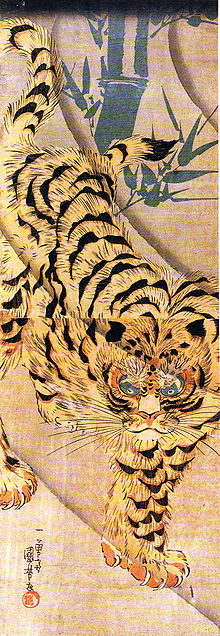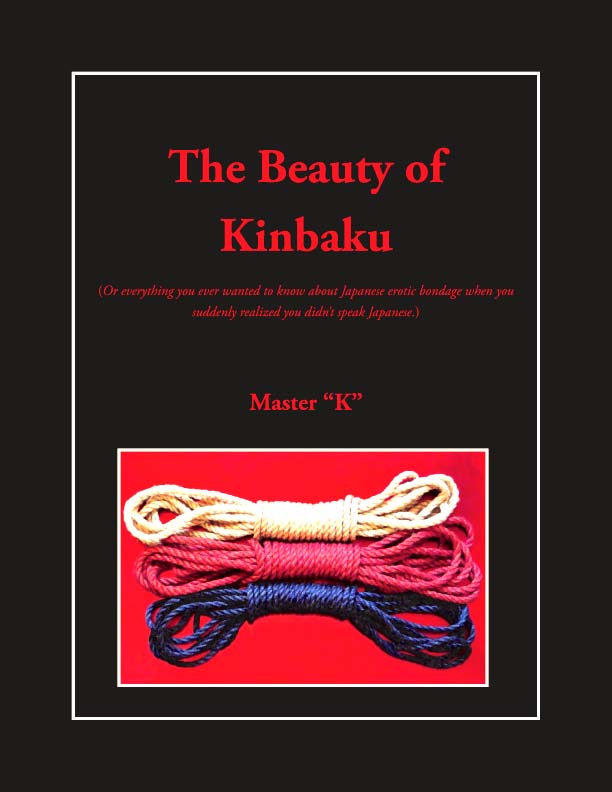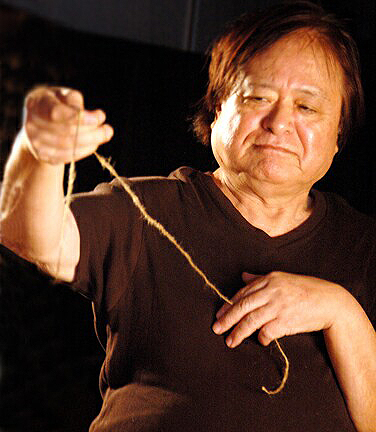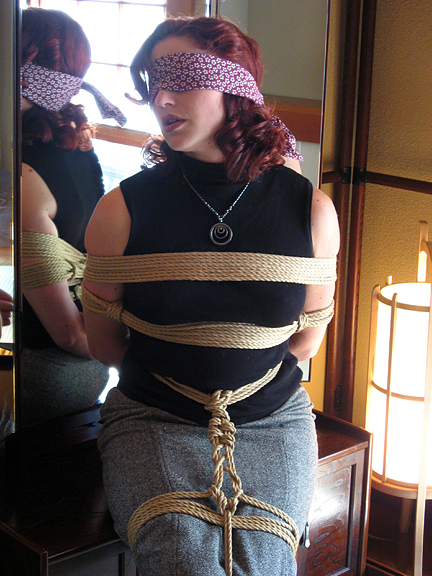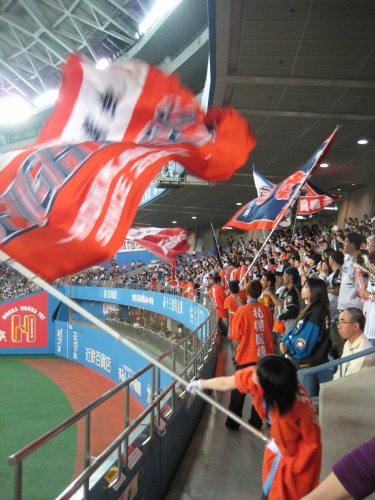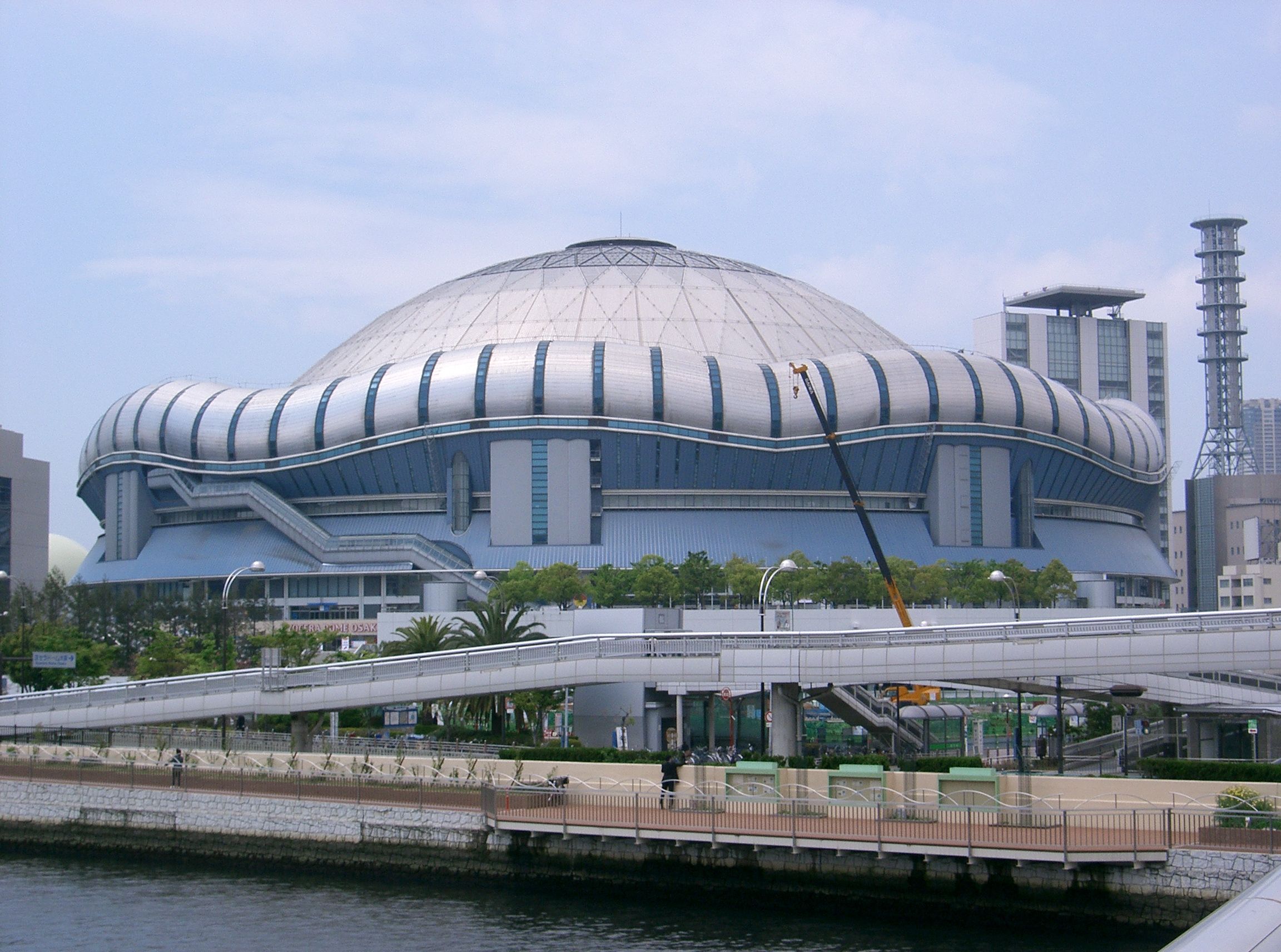The Beauty of Kinbaku
Or everything you always wanted to know about Japanese erotic bondage when you suddenly realized that you didn't speak Japanese
A Trip to Japan - Meetings with Remarkable Men #1- Introduction
by Master "K"
Greetings!
I recently returned from a trip to Tokyo and after writing to several friends about my experiences there the suggestion was made that I consider posting my "vacation notes" here for others to read. I'm not sure that they'll be of interest but, since much of my voyage was in the land of Japanese kinbaku (erotic rope bondage) I figure I'll give it a try.
That said, I hope the reader will forgive if these jottings don't have the polish of a finished work. They are, after all, only notes from a trip, the kind we all mean to record during vacations but often don't get around to doing. In this case, because the trip turned out to be so remarkable, I did make notes, in a little notebook bought in a fabulous, many floored book and stationary store in Tokyo. Some were quickly done, others took more time but, along with some snapshots, they do represent one of the most wonderful experiences I've ever had and some meetings with remarkable people. I hope you'll find them interesting.
First, a little background.
The idea of making this trip first began with the conviction at my "vanilla" job that "someone should go to Tokyo to forge some closer relations with our business contacts there." Because my love of that country is well known in the office, I was one of several possible candidates for the job. Frankly, as tempting as the trip sounded, I wasn't sure I wanted to go. It has been over 30 years since I first visited Tokyo as a student and, like many memories from college days, that time had developed a golden aura that I didn't want shattered if things had changed and Tokyo didn't live up to my youthful memories. On top of that, I was very busy with work, teaching and writing.
And then something interesting happened.
audiences. To say I was overwhelmed would be an understatement since, as you might imagine, having the book accepted in the land of kinbaku was a dream come true. However, the practical upshot of this was an enquiry from a Japanese publisher about obtaining the rights for a Japanese edition of my book. At about the same time as my office was considering sending someone to Tokyo, I received word that a prospective publisher would very much like to meet me and that, pending consultation with major book chains about my book, a publishing contract might be had. Gulp!
The final carrots.
As if this weren't enough motivation, the final remarkable occurrences in this chain of events leading me back to Japan an invitation passed along through intermediaries, from Nureki Chimuo;
at 80 the man generally regarded as
the most famous, if the not the greatest
bakushi (rope artist) in Japan. He had
liked my book and had stated that if I
could come to Japan by a certain date
in June, he would invite me to a
special photo shoot he was planning
for Mania Club magazine.
Picking myself off the floor, I realized
the die had been cast and that this trip
was fated because, work and book
deals aside, an invitation from Nureki
sensei is not something to be ignored!
As I began packing my bags, other
pleasant things continued to occur.
Thanks to some good friends in Japan
mentioning I might be coming and the
graciousness of others in accepting
invitations, I found myself looking forward to dinner with Yukimura Haruki, drinks with Arisue Go, coffee with Akira Naka and some quality time with Urado Hiroshi, the legendary Nikkatsu movie rigger. In addition, my good friend Osada Steve agreed to meet one evening and promised to bring his beautiful aerialist partner Ageha along and even hinted I might be able accompany him to one of his precious newaza (the floor/caressing style of shibari/kinbaku) lessons with that style's acknowledged master, Yukimura sensei. A dream line up of meetings to be sure!
And to top it all off, by coincidence, one of my more talented students, zetsunawa, was going to be in Japan for his work and expressed an interest in accompanying me to a few of these encounters. I just wish more of my students could have been there.
So these are the people I'll be writing about in the next few posts -- meetings with remarkable men (and women) in the world of Japanese kinbaku.
To close this first chapter, I suppose a few words should be devoted to why meeting these particular people in Japan was so important for me. The simplest answer is that these kinbaku masters generally represent the top of the art form as it's now practiced in the world and if you want to see this exotic and erotic discipline at its best then these are the folks to observe. To put it another way, imagine you're a young Japanese baseball fan. They play a good brand of the game there to be sure but, if you had the chance and really wanted to see the best, do you go to Osaka to see the Orix Buffaloes or is it to New York to see the Yankees? And, of course, I mean no disrespect towards the Buffaloes, a heck of a team.
One practical reason this visit was important is because of the centuries of tradition the Japanese bring to their style of rope art. I wanted to feel that again first hand. If Western rope might best be called a "method of restraint" then kinbaku is an "aesthetic of restraint" and there's a world difference between the two. The Japanese truly do have much to offer in terms of style, creativity and, perhaps most important of all, in an understanding of rope safety.
I have always thought that one of my most important functions as a kinbaku teacher was to impart a sophisticated understanding of rope safety to my students because, obviously, it's vital for their practical well being but also because there is often so much dubious, distracting information around. For instance, in this, the first week of my return from Japan, my students reported hearing these three statements, attributed to Internet posts/videos, Western publications or club appearances, being stated as facts:
1.) "The danger of crossed lines creating pressure points on the body is an urban myth."
2.) "Nylon rope is to be preferred over hemp for doing suspensions."
3.) "One style of gote (the famous Japanese box arm tie) is all that's needed for doing most Japanese style kinbaku ties."
All of these statements are incorrect. And it's not that the posters or presenters are foolish or incompetent. Not at all. It's just a little ignorance ... and unfortunately, especially when you're talking rope, ignorance can occasionally be dangerous.
For the record, sophisticated kinbaku practice and 40 years experience has









 taught me that:
taught me that:
1.) Crossed ropes can indeed create pressure points that can lead to pain and loss of sensation when one is doing suspensions, either partial or complete.
And so, for many reasons, practical, spiritual and just plain fun I set off for my kinbaku visit to Japan.
I hope you'll join me next time as I land in Tokyo for the first time in many years and have my encounter with the legendary and formidable master Nureki Chimuo.
Please note: no part of these articles may be reproduced by any means without the express written consent of the author or the publisher, King Cat Ink.
As some might recall, my second book on kinbaku was published about a year ago ("The Beauty of Kinbaku" - King Cat Ink). It has been rather nicely received in the West, for which I am profoundly grateful, but over the last half year or so it has begun to be seriously noticed in Japan. This time lag makes sense because, unlike E-mail, books travel the world a little more slowly and require word of mouth to get noticed, translated and commented on. What I didn'texpect was the kindness and warmth of the Japanese reaction to my work.
To my astonishment, many of the most famous names in Japanese kinbaku praised the scholarship of my effort, reviewed it favorably and recommended it to their
2.) Asanawa (Japanese hemp/jute rope) is always to be preferred over Western style nylon for doing suspensions (assuming the bakushi is using the correct width for the intended subject) because of it's softness (when properly treated), it's quality of sticking to itself (making untying easier and quicker) and its inability to be stretched (thus preventing unwanted tightening under weight). (Note: In fairness I believe the person making the incorrect statement on this subject did so because they didn't realize that authentic Japanese asanawa can now be easily purchased in the US.)
3.) One style of gote does NOT serve all kinbaku patterns. Different ties require different techniques in the creation of this most fundamental kinbaku pattern and only a veryunskilled practitioner would use the same gote for, say, ALL styles of suspensions or for newaza sessions.
Meetings With Remarkable Men
